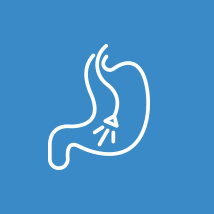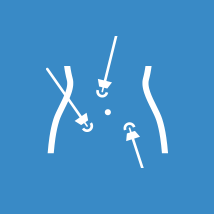Procedures
Our experienced team provides you with state-of-the-art services and ensures that you achieve a speedy recovery with the desired outcome. Our specialists are trained and have performed numerous successful surgeries to help patients return to their normal lives at the earliest. Our specialties include treatment of various colorectal and bowel problems. To know more, read below:
Colonoscopy is an endoscopic procedure used to view the large intestine (colon and rectum) using an instrument called colonoscope (a flexible tube with a small camera and lens attached at one end). The procedure can detect inflamed tissue, ulcers, and abnormal growths. It is used to diagnose early signs of colorectal cancer, bowel disorders, abdominal pain, muscle spasms, inflamed tissue, ulcers, anal bleeding, and non-dietary weight loss.

Colorectal surgery is performed for the treatment of conditions that involve the anus, colon or the rectum. Colorectal diseases can include a wide range of conditions such as colorectal cancer, colon polyps, diverticulitis, hernia, inflammatory bowel disease and rectal bleeding.

Hernia can be treated through laparoscopic surgery, also called keyhole surgery. This is a less invasive surgical method that uses a device called laparoscope (a small thin tube with light and a tiny video camera connected to a television monitor), which helps visualize the internal organs during the operation.

Upper GI endoscopy is a procedure performed to diagnose and in some cases, treat problems of the upper digestive system. Upper GI endoscopy can be helpful in the evaluation or diagnosis of various problems, including difficult or painful swallowing, pain in the stomach or abdomen, bleeding ulcers, and tumours.

The pelvic floor is a set of muscles that form a hammock or sling around the opening of the pelvis. The pelvic organs, including the womb (uterus), rectum and bladder, are held in position by the pelvic floor muscles and the surrounding tissues. The incidence of pelvic floor disorders increases when the muscles of the pelvic floor and connective tissue are injured or weakened. Some of the common pelvic floor disorders include pelvic organ prolapse, urinary incontinence, and anal incontinence.

Laparoscopy is a minimally invasive surgical procedure performed using a laparoscope, a thin fibre-optic instrument with a camera and lens attached to it. Laparoscopes can be used for diagnosing and treating various conditions.

General surgery is a specialty that deals with a wide range of surgeries and patient care before, during, and after surgery. General surgeons are highly skilled in the treatment of conditions such as appendicitis, hernias, gallbladder surgeries, stomach, and intestinal issues.
If you wish to be advised on the most appropriate treatment, please call to schedule an appointment or click to request an appointment online.